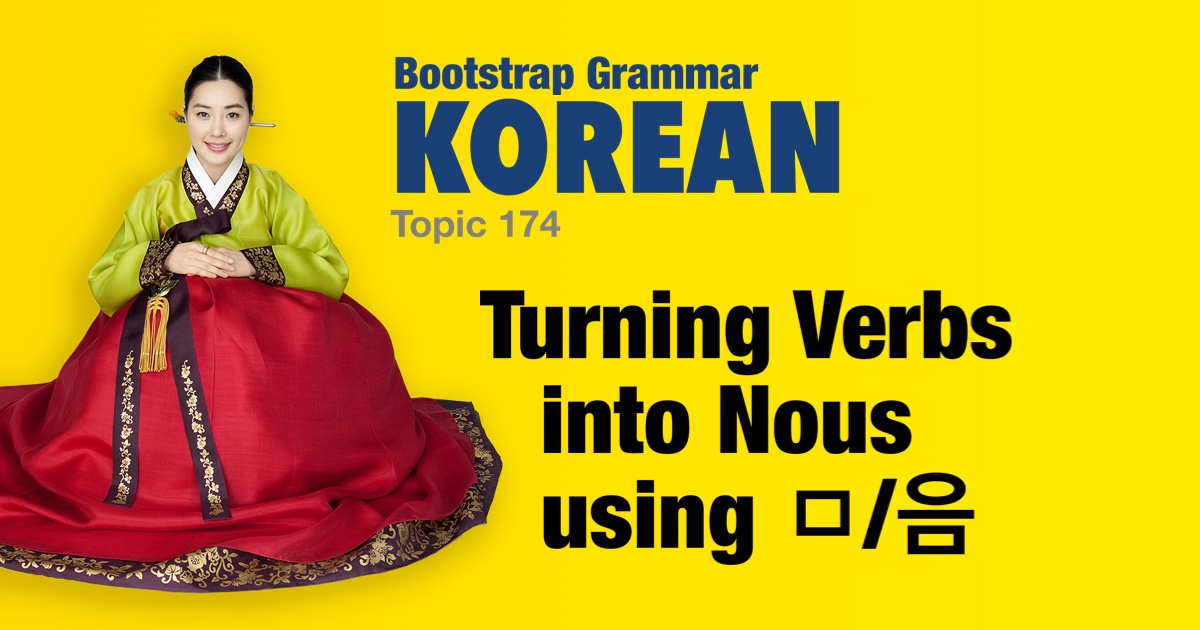Korean grammar - Turning Verbs into Nous using ㅁ/음 |
|||
|
|||
Adding ㅁ/음 to verbs (both action and descriptive) turns them into noun. It is another way to nominalize verbs. There are many common nouns formed in this way. It can technically be used to turn whole phrases into a noun but this is not typically done in spoken Korean. |
| Examples: | |
|
한국에 처음 왔을 때는 어려움이 많았어요.
When (I) first came to Korea, there were many difficulties.
|
|
|
권투 선수들의 싸움에서 누가 이겼어요.
Who won the fight between the boxers?
|
|
|
말싸움을 피하기 위해서 부부는 정기적으로 그들의 관계에 대해 대화를 해야 해요.
In order to avoid arguments, couples should have regular conversations about their relationship.
|
|
|
큰 물고기를 잡는 꿈을 꾸었어요.
(I) had a dream about catching a huge fish.
|
|
|
그는 자신의 나쁜 꿈에 대해 이야기했어요.
He was talking about his bad dream.
|
|
|
간밤에 이상한 꿈을 꾸었어요.
(I) had a strange dream last night.
|
|
|
저는 아픔을 못 느껴요.
I don’t feel pain.
|
|
|
도움 감사했어요.
(I) appreciate (your) help.
|
|
|
누구나 죽음에 대해 생각해요.
Everyone thinks about death.
|
|
|
몇 걸음만 더 가면 도착해요.
Just a few more steps and we arrive.
|
|
|
천리길도 한 걸음부터.
The journey of 1000 miles starts with a single step.
|
|
|
이것에 대해 나쁜 느낌을 가지고 있어요.
(I) have a bad feeling about this.
|
|
|
왜 잠이 안 오지?
Why can’t (I) fall asleep?
|
|
|
텔레비전을 켜 놓은 채로 잠이 들었어요.
(I) fell asleep with the television on.
|
|
|
가족 모임이 기대되요.
(I) look forward to family gatherings.
|
|
|
결혼식장에서 기쁨으로 가슴이 두근두근 뛰었어요.
(My) heart throbbed with joy at the wedding ceremony.
|
|
|
기쁨은 모든 사람의 인생 목표예요.
Happiness is everyone's goal in life.
|
|
|
그는 무거운 짐을 지고 언덕을 올라갔어요.
He went up the hill with a heavy load (on his back).
|
|
|
그럼 우리 6시에 만날까요?
Well then if (circumstances/schedules) are that way, shall we meet at 6pm?
|
|
|
그림을 잘 그립니까?
Can you draw (pictures) well?
|
|
|
메시지 알림들을 끄려면 이 버튼을 누르세요.
Press this button to turn off message notifications.
|
|
|
무슬림들은 예언자 무함마드의 가르침을 따라요.
Muslims follow the teachings of the Prophet Muhammad.
|
|
|
미국, 캐나다 등 큰 나라에서 졸음운전은 문제에요.
Drowsiness while driving is a problem in big countries such as the United States and Canada.
|
|
|
사우디 청소년 사이에서는 즐거움을 위해 독서하는 건 인기 있는 취미가 아니에요.
Reading for pleasure is not a popular hobby among Saudi teenagers.
|
|
|
세계인구의 20%가 굶주림에 시달려요.
Twenty percent of the world’s population suffers from starvation.
|
|
|
슬픔은 인간의 자연스러운 감정이에요.
Sadness is a natural human feeling.
|
|
|
술이 너무 달고 도수가 낮아서 포도주스나 다름없어요.
Since this liquor is very sweet and has low alcohol content, there is not difference from grape juice.
|
|
|
아이들의 웃음소리가 집을 가득 채웠어요.
The sound of the children’s laughter filled the house.
|
|
|
그는 어둠 속에서 불빛을 발견했어요.
He saw a light in the dark.
|
|
|
어렸을 때 친구를 사귀는 데 어려움을 겪었어요.
When (I) was young (I) had (suffered) trouble making friends.
|
|
|
어머니는 얼음이 언 보도가 미끄러우니 조심하래요.
(My) mother said you should be careful because the icy sidewalk is slippery.
|
|
|
우리 사회는 젊음을 유지하는 것을 크게 강조하지만 누구나 결국 늙어요.
Our society places great emphasis on maintaining youthfulness, but everyone eventually gets old.
|
|
|
연결된 세계에서 살고 있음에도 불구하고 전보다 외로움을 느끼는 젊은이가 더 많아졌어요.
Even though we live in a connected world, more young people seem to feel loneliness than before.
|
|
|
친구에게 도움을 주었어요.
(I) gave my friend some help.
|
|
|
캐나다는 자연스러운 아름다움으로 유명해요.
Canada is famous for its natural beauty.
|
|
|
피겨스케이터의 움직임은 아주 우아해요.
The movements of figure skaters are very elegant.
|
|
|
할아버지의 죽음에 대해 들었을 때 그는 울음을 터뜨렸어요.
When he heard about his grandfather’s death, he burst into tears.
|
|
 |
|




